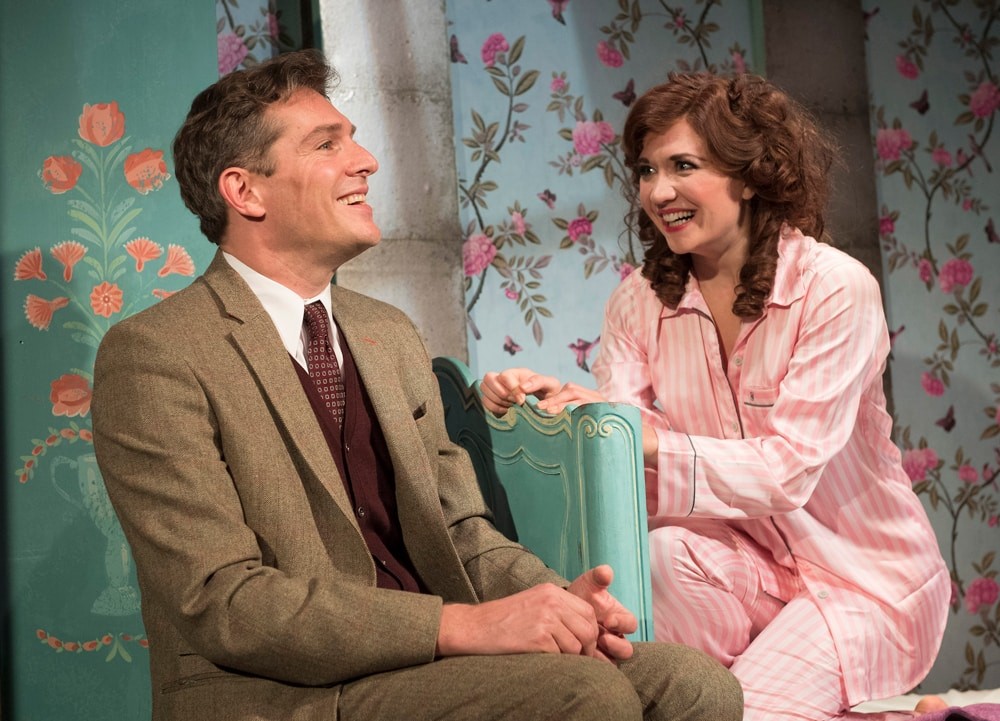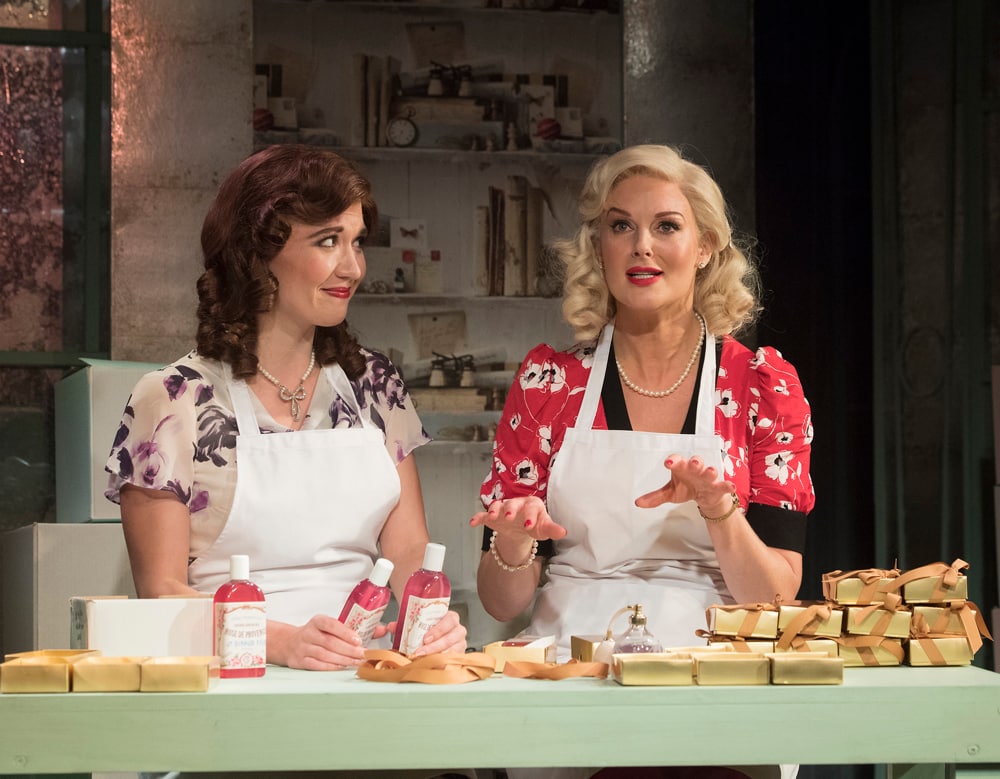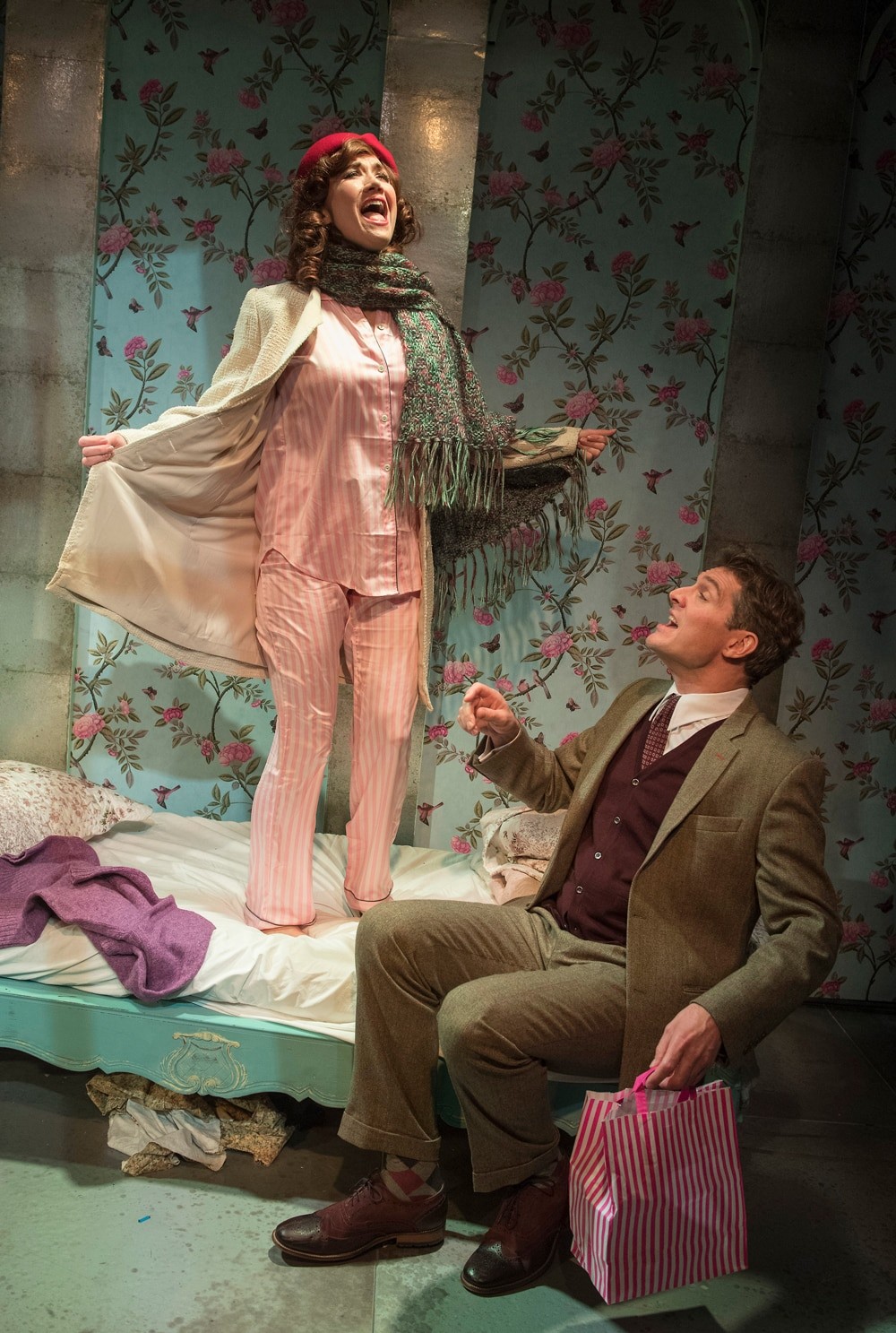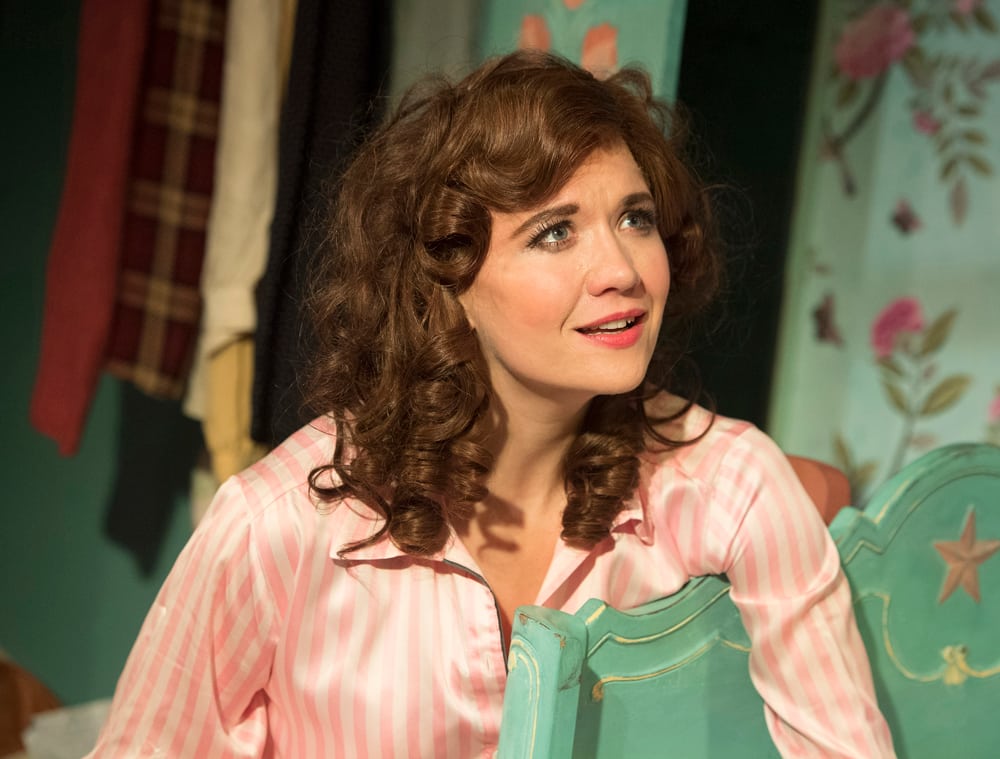NEWS TICKER
REVIEW: She Loves Me, Menier Chocolate Factory ✭✭✭
Published on
December 9, 2016
By
julianeaves

Mark Umbers and Scarlett Strallen in She Loves Me. Photo: Alastair Muir She Loves Me
Menier Chocolate Factory
8th December 2016
3 Stars
There is a powerful generosity in the admiration of genius that borrows from its greatest achievements the laurels of glory and bestows them upon its lesser accomplishments. And nowhere truer is that than in the case of those giants of musical theatre, Jerry Bock and Sheldon Harnick, creators of a solitary but utterly magnificent triumph: the score of that colossus of the stage, ‘Fiddler On The Roof’. That singular, dazzling masterpiece shines so brightly that the rest of the output of that remarkable pairing is laden with suspicions that, could we but discern them, we might find therein magic of a similar order, beauties of commensurate felicity, insights into the human condition of equal profundity, and so on. We come to believe they must be there: if only we could find them….

Scarlett Strallen and Katherine Kingsley in She Loves Me. And so the search goes on. Productions of their less successful works multiply. This particular property – a show that, for all sorts of very good reasons, has never found a permanent place in the repertoire - is a 1963 musicalization of Miklos Laszlo’s Hungarian comedy ‘Parfumerie’. At the point of its composition, the story had already been twice filmed in English, first as Lubitsch’s ‘The Shop Around The Corner’ and then as the Judy Garland vehicle, ‘In The Good Old Summertime’. Producers from those ventures regrouped and engaged Joe Masteroff to do the book for Bock and Harnick’s finely interwoven, if more often than not dramatically redundant, songs. (OK, nothing so wrong in that: ‘My Fair Lady’ doesn’t actually need its songs.) The work they created is a marvel of technical integration – up to a point. A big problem is the thinness of the story, built on such musico-dramatically intractable material as reticence, shyness, evasion, embarrassment and gender roles that were already out of step with history when the work staggered, for a modest 300-odd performances, onto and then briskly off Broadway (it managed far fewer in London). A year later came ‘Fiddler’ with its mind-boggling run of over 3 200 curtain raises, ever since which ‘She Loves Me’ has struggled with that complicating factor of being the weakly relative of a much more powerful sibling, kept on a life-support-system long past the hour of its appointed demise.
It is not without charms, of course. The individual components are often very attractive. They just don’t – quite – hang firmly enough together to make a compelling case. Yet, most recently, it has been trumpeted the length and breadth of Broadway as a ‘wonder’, and lately has also made a couple of appearances in London. The last one of those that I saw, Robert McWhir’s final in-house presentation for his excellent (and much missed) Landor Theatre, came pretty close to achieving a resounding success. Thus, I went to see the great Matthew White’s new offering at the Menier filled with hopes that he might also get fairly close to being a hit.

Scarlett Strallen and Mark Umbers in She Loves Me. Photo: Alastair Muir White’s qualification for the job could hardly be more promising. His recent adaptation and production of the Fred and Ginger musical ‘Top Hat’ was a miraculously perfect affair, demonstrating his supreme mastery of musical theatre. However, he did enjoy exceptional freedom on that project, being licensed to make his adaptation in whatever way he saw fit: this is a very, very rare event in the life of any director of musical theatre. Secondly, while theatres like (note the comparative) the ‘fringe’ Landor might bend the rules a bit – or a lot – and make unofficial ‘amendments’ (ie. improvements) to the published script, established ‘off-west end’ venues like the Chocolate Factory have to play much more by the rules, and when they seek a possible West End transfer (as is the Menier’s wont), then you can be pretty damn sure that what you are getting is chapter and verse, at least as it stands in accordance with the strictures imposed by the licensing authority.
Some directors say that their main job is to disguise the weaknesses of a script. And they are not wrong. Strengths tend to speak for themselves, but weak points yell on behalf of your detractors. So, we don’t like to hear them. When she or he takes on a job, it is with a hope and a prayer that it will be possible to navigate a fairly safe course through the pitfalls and obstacles placed in their way by writers and previous producers and directors (whose imprimature can easily outlast the century of the work’s creation). When presenting a piece that is demonstrably less than perfect, as in this case, then the stakes in the gamble are high indeed.
Well, so much for theory. Now to this production. Here, things begin promisingly enough. The inestimable Paul Farnsworth’s handsome set and costume design begins with a rippling front cloth with ‘that’ view of the Hungarian Parliament building, seen across the Duna, and serenaded by a brilliantly virtuosic gypsy violin of the first water (Phillip Grannell or Darius Luke). (We know another Bock and Harnick musical that begins with a gypsy violin, don’t we, children?) Indeed, MD and Music Supervisor Catherine Jayes understands this theatre well, and has chosen a band of truly wonderful ability and stylishness: Edward Maxwell’s brilliant trumpet; Stephanie Dyer or Jane Salmon’s fine trombone; Bernie Lafontaine’s lovely reeds (flute, and a variety of clarinets, including a stunning bass); Romano Viazzani’s authentic accordion; the double bass of Paul Moylan and James O’Carroll’s smart percussion. We also believe we are hearing a harp and glockenspiel, but these are smooth tricks of Jayes’ keyboard skills, I’m sure. Jason Carr has done a neat job of abridging the original arrangements: and the band sound is just right for the dimensions of this venue.

Scarlett Strallen in She Loves Me. Photo: Alastair Muir The singing of the score is every bit as pleasing. Callum Howells makes for an amiable Arpad; Alastair Brookshaw is a sharp-eyed and soft-hearted Sipos; Katherine Kingsley sounds a welcome and much needed note of female feistiness as Ilona; Dominic Tighe comes off the better – as actors in this role always do – as the rat Kodaly; Mark Umbers sounds deliciously like Jeremy Brett as the charming, gentlemanly Nowack; Les Dennis is an agreeable Mr Maraczek; Scarlett Strallen makes the most of every opportunity as Amalia, although we constantly wish the score to give her magnificent voice even more chances to thrill and the script to supply her character with more of a spine; Peter Dukes is a nice Keller; Cory English I saw as the Waiter (he will be replaced from Jan 10th to Feb 6th by Norman Pace) and surely White sees him in a kind of ‘Eric Blore’ type role here. Rachel Bingham, beautifully moving Matt Crandon, Luke Fetherston, Olivia Fines, Aimee Hodnett, Sarah-Jane Maxwell and Vincent Pirillo make up the superb ensemble.
As for the score itself, it is part ‘The Czardas Shopgirl’ and part ‘Give My Regards To Vorosmarty Square’: in one direction we are pulled towards the delirious nonsense of Viennese operetta, and in the other we list towards Sixties Broadway glamour; and the more I hear the score, the less I comprehend the reasons for these opposing stylistic choices (assuming there are any). The music is always terrific to listen to, but as a whole it simply refuses to coalesce.
Then, to Mr Masteroff’s script: we are getting a much longer and wordier text than I recall hearing played at the Landor. We have much, much less in the way of choreography (even though when Rebecca Howell gets the chance, she shows off some really stylish moves) than I recall being the case in Clapham. This is such a pity. Howell’s use of movement is utterly fascinating: she can conjour to mind the paintings of Otto Dix or Tamara de Lempicka in an instant; the café sequence is a glorious set-piece, but seems to pass by without fully establishing itself at any visceral level.
Meanwhile, the design of the perfumerie, in which the bulk of the action takes place, initially stuns – a lush interior with much gilt and moulded ornamentation, a kind of High Street rococo: a very middle-class lady sat near me said it reminded her of Penhaligon’s, with shelves of perfume bottles apparently lit from within. Paul Pyant is the one controlling the illumination, and he mostly keeps things bright and cheery (although there’s some wonderful seasonal mood painting in the Act 1 montage). That is probably deliberate. The whole production is light, amiable, pleasant, tending towards comfort, luxury, leisure and the graciousness of the reasonably successful commercial classes. The absence of darker tones creates a trouble-free environment, but possibly at the cost of any dramatic tension or sense of conflict. Even adultery and suicide come and go without causing much of a stir. If you’re looking for a pain-free experience, you will get one. But it you need something stiffer then you might find it all just a little bit too fluffy and even trivial. That works for ‘Die Fledermaus’ or ‘The Czardas Princess’, but here it seems somewhat awry.
We are, after all, in Budapest in the 1930s. Fascism is a growing force all around, including at home under the iron heel of Admiral Horthy, while communism is flourishing in the east. Anti-semitism is about to propel Europe into the Holocaust. None of this gets more than a whisper in the script. Thank heaven Masteroff didn’t pull any punches when he wrote the book for ‘Cabaret’! Thank heaven Rodgers and Hammerstein hadn’t when they wrote ‘The Sound of Music’ just a few years earlier. And thank heaven Bock and Harnick spoke more from the heart in ‘Fiddler On The Roof’. As for this show, it’s all rather pretty and well-behaved and won’t do you any harm. Nothing to be ashamed of, just don’t expect the earth to move.
BOOK TICKETS FOR SHE LOVES ME
© BRITISHTHEATRE.COM 1999-2024 All Rights Reserved.
The BritishTheatre.com website was created to celebrate the rich and diverse theatrical culture of the United Kingdom. Our mission is to provide the latest UK theatre news, West End reviews, and insights into both regional theatre and London theatre tickets, ensuring enthusiasts can stay up to date with everything from the biggest West End musicals to cutting-edge fringe theatre. We are passionate about encouraging and nurturing the performing arts in all their forms.
The spirit of theatre is alive and thriving, and BritishTheatre.com is at the forefront of delivering timely, authoritative news and information to theatre lovers. Our dedicated team of theatre journalists and critics works tirelessly to cover every production and event, making it easy for you to access the latest reviews and book London theatre tickets for must-see shows.